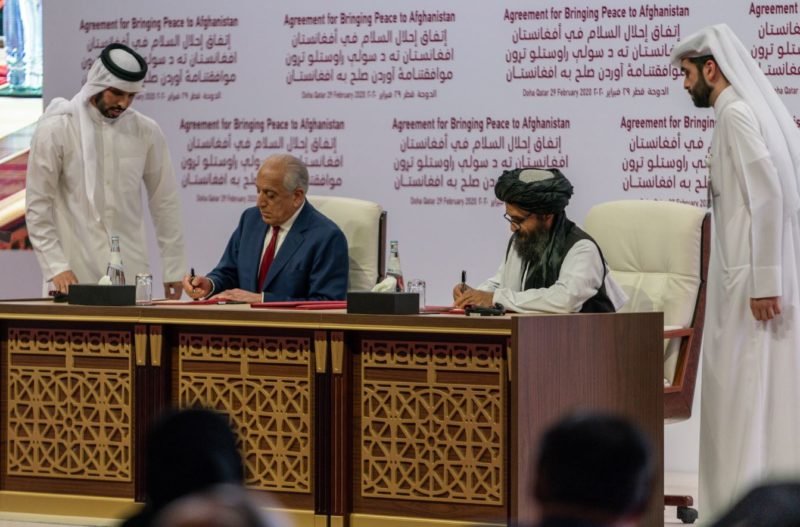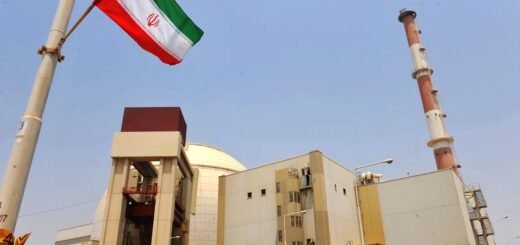The Future of Afghanistan after Doha Peace Deal

The much speculated U.S.-Taliban peace deal has already taken place. The two agreements signed by the U.S. are one in Kabul with the Islamic Republic of Afghanistan (IRA) and other in Doha with the Islamic Emirates of Afghanistan (IEA). This deal has fixed the time frame in which U.S. troops will leave Afghanistan and finally giving a political status to the Taliban. Presidential elections in the U.S. are near and this step can become a major reason for Trump’s high scorecard.
But everything is not very clear about the future of Afghanistan, as Kabul has gone through elections just last year in September, in which Ashraf Ghani has been again re-elected as the President. India with many other nations has also recognised the Ghani government, as the winner of 2019 elections, but this deal raises questions whether it will sustain in future of not.
The deal signed between Mullah Abdul Ghani Baradar, leader of Taliban delegation and Zalmay Khalilzad, U.S. special envoy for peace in Afghanistan. This will finally end 18 years of a long war in Afghanistan in which more than 2,400 Americans have lost their lives. Many questions are still to be answered, which are also definitely a reason for concern for various countries.
President Trump wants himself to be seen as a propagator of peace, who brought American troops back home and ended the longest U.S. war. The deal provides a detailed timetable for U.S. troops withdrawal. This deal has provided the Taliban, a much white image, which it is definitely not in actual. In fact, it can provide a pass of unspeakable brutalities and savagery to the Taliban as they grab the power again.
India has raised it’s concern over the future of democracy, human rights, women rights and other achievements since 2001 when the Taliban regime was last defeated. These issues are not addressed in this deal, so it would be important to see, how the Taliban will go for a democratic setup.
In Doha agreement, the Taliban has guaranteed enforcement mechanism, that will prevent the use of Afghan soil by any group or any individual against the security of the U.S. and its allies. However, it is unclear whether India, which is not in the list, also included in this definition. India is also concerned, about what would be the role of Pakistan over this, as many Pakistan operated groups that threaten India would still maintain their presence in Afghanistan.
India is worried about the mainstreaming of ‘Haqqani Network’ which was responsible for the release of prisons forcefully from India. India and the Taliban have a bitter past. The Air India airline flight IC-814 hijacking in 1999 was carried out with the help of the Taliban to get free Jaish-e-Mohammad leader Masood Azhar, who was in an Indian jail.

According to the agreement around 5000 prisoners will be released by March 2020. United States has also committed to taking the leave and leaders of U.N. Security Council sanctions test by May 2020, which could consider only bring down the number of terrorist in Pakistan accused of harbouring terror outfits.
However, Afghanistan’s President Ashraf Ghani after this agreement said that he will not release 5,000 Taliban prisoners, as laid out in a peace agreement that the U.S. signed with the Taliban. This public disagreement with the contents of the agreement presents the first major hurdle in its implementation. According to Ghani, the U.S. could not promise a prisoner swap because it is his government’s sovereign right to release and accept prisoners.
Coming to India’s official response over the deal, Indian Foreign Minister, S Jaishankar said that, India is not surprised and sooner or later this was about to happen. But Afghanistan is not the same, what it used to be 20 years back, things have transformed now, he said “I do believe that the past 20 years have brought about big changes in the war-torn country. This is not the Afghanistan of 2001. Our message to the United States is the achievements should not be lost. We have to wait and see how it plays out.
Further, he added, sooner or later Taliban will come to power with international recognition. India will have then have to open links with them. There are indications now that Pakistan based ‘Haqqani Network’ will emerge as leaders. India will now have to take a strategic approach, once everything settles down.
To conclude, it will not be wrong to call this deal a ‘deal of escape’. This so-called peace deal can backfire anytime and turn into a ‘war deal’ making Afghanistan more fragile than ever before. Any big player can enter the arena as the U.S. will take its hand out. The bad faith of the Taliban is already evident. The idea of a ceasefire, which is very important in any peace deal have vanished just within a couple of days.
Taliban has ended the partial truce by again starting the attacks. Just days after the U.S. and Taliban announced the terms of a deal lauded as a foundation for peace, Afghanistan is once more embroiled in deadly violence. The U.S. carried out its first airstrike on the Islamist militant group since announcing the agreement. However, according to the U.S., it was a defensive strike in Helmand province was aimed at disrupting Taliban fighters who were actively attacking an Afghan security checkpoint. Rest, everything depends on time and priorities.


















